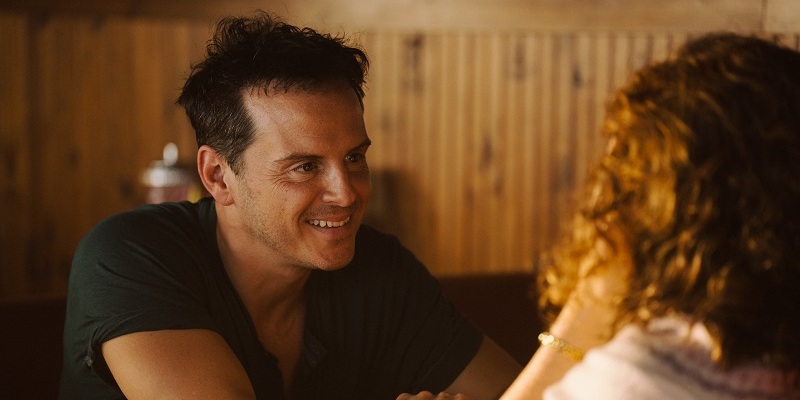
A man finds his parents living in his childhood home despite them having
been killed when he was a boy.
Review by
Eric Hillis
Directed by: Andrew Haigh
Starring: Andrew Scott, Paul Mescal, Claire Foy, Jamie
Bell

I haven't read Taichi Yamada's 1987 novel 'Strangers', but I have
seen its enigmatic 1988 cinematic adaptation, director Nobuhiko
Obayashi's The Discarnates. Obayashi's film veers wildly between a heartbreaking melodrama and a
horror movie in a way I suspected Andrew Haigh's English language
reworking would never dare. Likely a symptom of the modern western
filmmaker's fear of including any elements a cynical audience might consider
hokey, Haigh has dropped practically all of the original's horror elements
in order to focus on the melodrama. In doing so, his film is more tightly
focussed but the final act of this version comes off as jarring as the
groundwork for its late developments hasn't been laid.
Andrew Scott plays Adam, a gay screenwriter who lives in a London
tower block straight out of a Ballard story. Struggling to write a script
about his childhood, Adam finds that listening to his favourite 1980s pop
tunes isn't enough to provide inspiration. He decides to visit his suburban
childhood home, where he is shocked to find his mum (Claire Foy) and
dad (Jamie Bell) seemingly still alive despite having been killed in
a car accident when Adam was 12.

Adam's parents greet him as though he's simply returned after having
emigrated, commenting on how much he's grown since they last saw him. Rather
than question his sanity, Adam throws himself into this odd reality he finds
himself in, taking the opportunity to bond with his parents as an adult in a
way he never quite could as a child.
Having never had the opportunity to come out to his parents while they were
alive, Adam opens up to his mother over tea one afternoon. For her it's
still the late '80s, and her reaction reflects the ignorance of that era.
She worries about AIDS, and remarks that "I hear it's a very lonely life."
Adam assures her that if he's lonely it's not because he's gay, but Scott
plays the moment in a manner that suggests he doesn't entirely believe his
own words.

Adam's lonely life is enlivened when he begins a relationship with Harry
(Paul Mescal), the only other resident of his tower block. The
twentysomething Harry may be from what is considered a more progressive
generation but being gay seems to have caused him just as much loneliness.
He confesses to being estranged from his family, seems to struggle to find
love, and has a dangerous self-medicating relationship with drugs and
alcohol.
The key theme of The Discarnates was how grief and nostalgia
can be consumptive and unhealthy. In that film the protagonist slowly turns
into a zombie the longer he spends in his parents' company. It's rendered
through some unconvincing make-up, but the allegory works nonetheless. Adam
doesn't physically deteriorate in the same way and there seems to be no
downside to his relationship with his parents, which makes their actions
towards him in the final act seem unnecessarily cruel. The final blood
soaked twist of the Japanese film worked specifically because its
protagonist is explicitly characterised as a misanthropic asshole at the
beginning of the film, becoming a better man thanks to the influence of his
spectral parents and the troubled neighbour who becomes his lover. Scott's
Adam is a lovely bloke from the start, which makes the final twist less
convincing here.

As its protagonist was a heterosexual man,
The Discarnates didn't have much to say about the generation
gap, but Haigh uses Adam's sexuality to interrogate how we look back at less
enlightened times. Younger generations like to think that if they lived in
the past they'd still possess today's attitudes. It's a notion Haigh
dismisses. Adam's parents aren't casually homophobic because they're bad
people, but simply because they grew up in an era that gave them no reason
to view homosexuality in a positive light. Their reaction to Adam's
revelations are cruel, but not willingly so, and in Adam's presence they
interrogate their own beliefs. The movie's best scene sees Adam's father
confess that he heard his son's childhood tears and ignored them because he
couldn't process the idea of his son being gay, only to tearfully ask Adam
for forgiveness. It's a reminder of the importance of truth and
reconciliation, a notion that's very untrendy in this modern era of
reductively writing off anyone whose ideas we disagree with.
Tellingly, the gay anthems that make up All of Us Strangers' soundtrack are all from the 1980s, an era when it seemed every other
popstar was openly gay. If things have really gotten better, why are there
so few gay popstars now? Haigh's film asks us to stop wagging our fingers at
the past and ask if we're really living in the best version of the
present.


